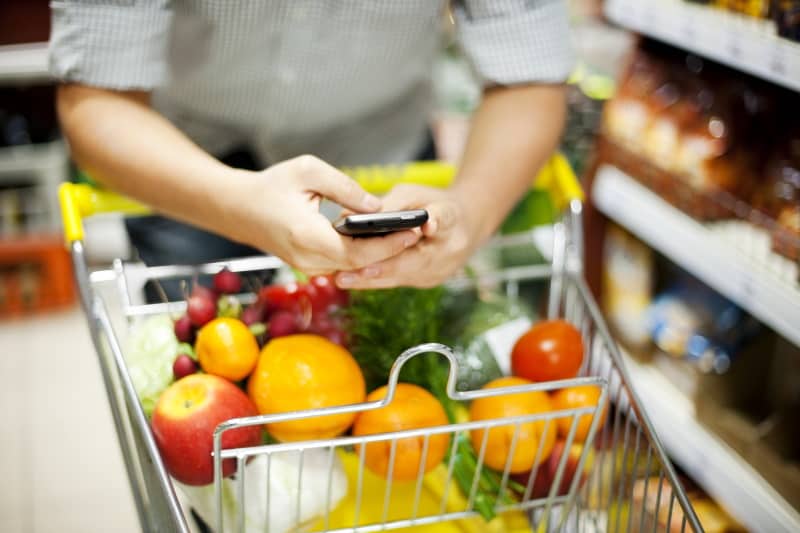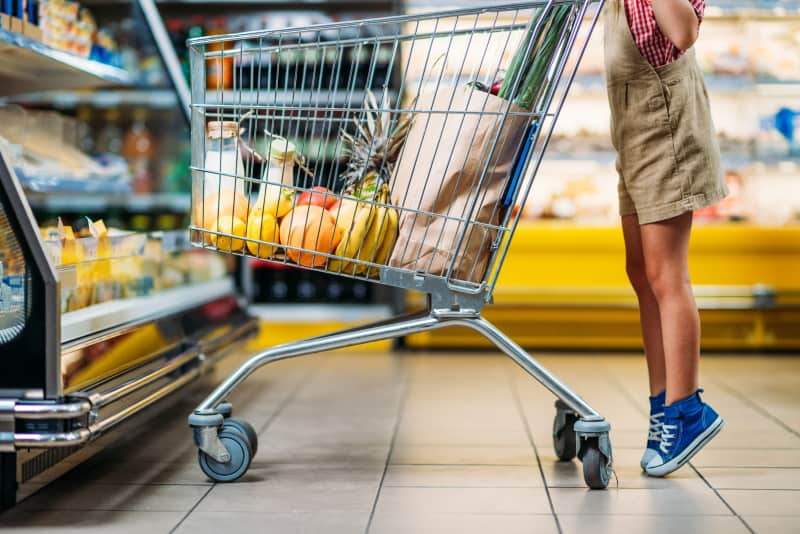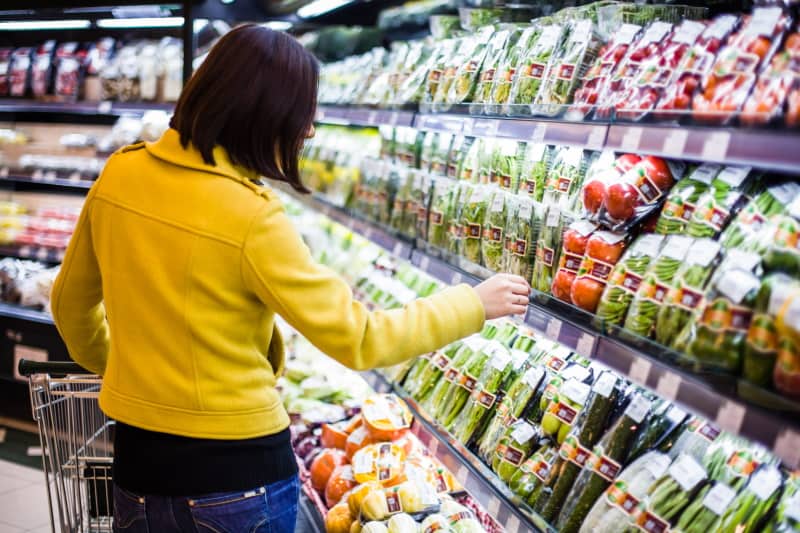How to Save Money on Groceries (Without Coupons)
This post may contain affiliate links. Please read how we make money for more information.
For most families, groceries can be a real budget buster. And other than using a few coupons here and there, many don’t bother trying to save money on the food they buy. After all, we have to eat, right?
But relying on coupons isn’t the only way to save on groceries. There are other ways to save big on the food we eat. All it takes is a little knowledge and preparation. It just requires changing a few shopping habits to see the savings stack up.
It’s definitely possible to dramatically lower your grocery bill without becoming a coupon clipper. Here are some simple strategies on how to save money on groceries:
Table of Contents
1. Skip the Name Brands

A very simple but powerful way to save big on your groceries is to simply avoid buying name brand products. Go with generics or store brands instead. You might be surprised by how big of a difference it makes at the cash register.
Many believe that name brand products are somehow better than generics or store brands. But in many cases, this simply isn’t true. In fact, many stores buy their own versions of products from the exact same companies that sell branded products. They then apply their own labels and sell the products as their own for less.
2. Go Shopping by Yourself
Although it may not always be possible, you may be able to save money by going shopping without bringing the kids along. And you may have to leave your significant other at home, too.
Shopping with others around can be distracting. You want to have your game face on when you are grocery shopping for maximum savings. And if you have a little version of you asking you to buy something extra – something not on your list – that can easily cause your tab to be higher than you planned.
Sometimes it’s hard to say no to those we love.
3. Shop at Discount Grocery Stores
Just as many skip store brand products for name brands, many also head straight to the big chain stores for their groceries. But here’s something many don’t consider when shopping at these stores: All of the fancy displays, lighting, and other overhead is added to the price of the products you buy.
You can save a surprising amount of money by shopping at discount grocery stores instead. Just a few include Save-A-Lot, Aldi, Grocery Outlet, Fareway, Dollar Tree, and others.
One of the main reasons why discount grocery stores have lower prices is because they aren’t fancy. They don’t have fancy lighting or product displays. In fact, most of the time these stores stock products on their shelves in the original boxes they were shipped in.
The simplicity of these stores is what makes them so affordable. They also tend to carry more generic products, too.
4. Don’t Buy More than You Need
If you ever see a product that’s marked two for $6 or three for $12, it’s important to keep in mind that you don’t have to buy more of that product than you actually need.
Stores often price their products like this to get shoppers to buy more. It’s a gimmick to make you think you’re getting a great deal. If you are ever unsure of the individual cost of a product, ask someone to help you. That’s what they are there for.
5. Consider Buying in Bulk
Another way you can potentially save a lot of money on groceries and other items is to shop at a membership store like Sam’s Club or Costco and buy in bulk. This strategy is best for things you use a lot of like canned foods, toiletries, soap, laundry detergent, diapers, and others.
You really have to be careful with buying in bulk for two reasons. First, depending on the product, you don’t always come out ahead financially. Sometimes you can actually save money on certain items by shopping at discount grocery stores and other places.
The second thing you need to be careful with when shopping for bulk groceries is the temptation to buy more than you need. Sometimes the deals in these stores can seem too great to pass up, and that may cause you to spend way more than you otherwise would on some products.
6. Don’t Shop on an Empty Stomach
Nearly everyone has heard that you shouldn’t shop for groceries when you’re hungry. But this isn’t an urban myth. If you shop for food while your stomach is growling, you will be more likely to purchase additional items.
You don’t necessarily have to eat a large meal before you go shopping. Even just a light snack may be all you need to help you focus on your task and not add additional items to your cart just because you can’t stop thinking about eating.
7. Use a Shopping List
One of the easiest ways to save money on groceries is to simply make a list of the items you need before you go shopping. And here’s the really important part – you force yourself to stick to the items on your list while you’re in the store.
Many shop for groceries without having a plan. They go in the store and go down each aisle filling their carts with whatever catches their eyes. Having a list (and sticking to it) is a great way to save on impulse buys.
There are exceptions to sticking to your list, of course, like if you forget to add something to your list that you know you really need. A list should be used as a guide. Sometimes it’s okay to break the rules – like when you run out of toothpaste or toilet paper.
8. Create a Grocery Budget
In addition to using a list when shopping, you may also want to create a monthly budget for your groceries. It’s very common for shoppers to use both a list and a budget together for maximum savings. Having a budget helps you when you are tempted with impulse buys.
How much should your grocery budget be?
It’s entirely up to you. There’s no set rule to follow. When creating your grocery budget, however, you do need to consider how much food you’ll need to buy to feed your family.
9. Take a Calculator with You
Have you ever filled up your cart with groceries only to be shocked by the total at the cash register? If so, you’re not alone. It’s very easy to let the tab get out of hand while shopping if you don’t have a way to add up the cost as you go.
A great way to keep track of things – and to prevent any unpleasant surprises – is to take a calculator with you. A pen and notepad are also handy to have, too. If you keep track of the balance as you go, it will help you stay within your budget. Sometimes just keeping track of your running total is enough to make you reconsider some purchases.
10. Don’t Just Shop at Eye Level
When you are in the grocery store, be sure to check out the prices of items that are above and below your eye level. The reason for this is simple. Grocery stores often stock their most expensive items at eye level and place more affordable items out of your line-of-sight.
The people who design grocery stores and deal with product placement are very clever. They try to trick you into buying more products than you need and to get you to buy their most expensive products.
11. Do Your Shopping on Markdown Days

Did you know you can actually save a lot of money by only shopping on certain days of the week? It’s true.
Many grocery store managers mark down prices on certain days of the week. They do this to move the merchandise as quickly as possible so they don’t get stuck with products that are getting near their “sell by” dates. You can use this strategy to your advantage to really save big.
Many stores mark their products down on Wednesdays, but this isn’t always the case. If you are unsure, just ask the manager what day of the week they usually put products on sale.
12. Watch the Cash Register During Checkout
When you are checking out at a grocery store, be sure to keep a watch on everything. Mistakes do occasionally happen. Sometimes products are scanned more than once, for example. And sometimes products that are marked down come up at the regular price at the register.
If you do notice something during checkout, be sure to quickly bring it to the attention of the cashier. It’s okay if a manager has to be called in to correct something. After all, it’s your money on the line.
13. Check out Your Local Farmers Market
While the convenience of modern grocery stores is indisputable, you may be able to find some great deals on produce at your local farmers market. In addition to knowing your food is locally sourced, it’s also great to know that the money you spend on your food stays local.
It’s important to keep in mind when shopping at a farmers market that whether you find a great deal or not depends on the vendor. Some will have great prices while others will be overpriced. Because of this, it’s important to get to know the vendors and become familiar with their prices and the prices of similar items at grocery stores.
14. Find the Clearance Aisle
Nearly all grocery stores have a special aisle where they stock items that are on sale – a clearance aisle. These isles are often found in the back of the store. If you can’t find a store’s clearance aisle, definitely ask someone to point you in the right direction.
The great thing about clearance aisles is the products are often greatly discounted over their regular prices. Don’t be surprised if you find discounts of 50% or more! These items are heavily discounted to make sure they sell quickly so the store doesn’t get stuck with merchandise that has exceeded its “sell by” date.
15. Skip Prepared Foods
Foods that have already been cooked and are ready to eat are almost always significantly more expensive than buying the individual ingredients and making them yourself. It takes work to bake cakes, cookies, pies, and other things. And you pay a steep premium when you buy these items instead of making them yourself.
Buying individual ingredients and preparing meals yourself is almost always cheaper than buying items ready-to-eat. As an added bonus, you can even experiment with different recipes to make things that taste better or are better for you than what’s in the store.
16. Don’t Buy Products at the Checkout Counters
Many stores place a number of small items right at the checkout in the hopes you will grab one last item on your way out. For most, these are usually impulse buys. A few examples include chewing gum, breath mints, magazines, and beverages.
Sure, the convenience is great, but these items are often overpriced. For example, you may be tempted to buy a small bottled soft drink for $1.50. But you can probably get the same soft drink in a two-liter container at another part of the store for the same price. Do you see the problem?
17. Get a Rain Check
Sometimes a store will run out of an advertised special. If this happens, you may still be able to take advantage of the discount by asking for a rain check. A rain check is a voucher that states you are entitled to the same discount but at a later date when the store has more of the item in stock.
To get a rain check on an item, you have to ask a manager. It may not always be possible to get a rain check, but you’ll never know for sure unless you ask.
18. Buy Meats That Are on Sale
You can often get a great deal on meats by buying them when they are nearing their expiration dates. It’s usually fine to buy these meats as long as you are going to cook and eat them soon. Stores couldn’t sell these meats if they weren’t still safe for consumption.
19. Purchase In-Season Produce
When shopping for fruits and vegetables, you can save a lot of money by only purchasing produce that is in-season. Produce that is out-of-season is typically a lot more expensive because it has to be transported long distances from countries where it is grown. It’s the transportation cost that adds to the price.
20. Use the Ibotta App
One of the best ways to save a lot of money on your groceries is to use the Ibotta app for your smartphone.
What’s the Ibotta app? It’s a free app you can use to get cash back on your grocery and other purchases. I don’t know about you, but I’m all about free money. Since the app is completely free to use, you have absolutely nothing to lose by trying it.
Using the Ibotta app is very easy. The first step after installing it is to locate the store you want to shop at in the app and find out which items are cash back eligible. You then do your shopping as you normally would.
How much cashback can you earn with the app? It depends. For generic items, it could be as little as a few cents per item, but for brand name products it can go as high as $3.00. Although it may not sound like a lot, the cash back money you can earn can really add up.
After you finish shopping, you upload your receipt information to Ibotta. You may be able to do this by simply scanning the barcode on the receipt with your smartphone camera. It’s important to note that Ibotta may require you to watch a short video, participate in a survey, or do something else before you will be awarded the cash back money.
Overall, the process is very easy, and you might be surprised by how much cashback money you earn after just a few trips to the grocery store.
21. Freeze Your Leftovers

A very simple way to potentially save big on groceries is to not waste any food. One way you can do this is by preparing large meals and freezing the leftovers. The idea is to prepare more than you think you will need for a meal and then save the rest.
If you store your leftover food, you can use it for a variety of things later. You could, for instance, reheat a leftover meal and eat it for lunch the next day. You could also save leftover vegetables and make a vegetable soup out of them when you have saved enough.
22. Plan Your Meals Around What You Already Have
Are you out of a certain ingredient for a meal you were planning to make? If so, resist the urge to make a special trip to buy whatever it is you need. While you’re at the store, you might just see a few other items you want and end up spending more than you planned.
Instead of running out to the grocery store whenever you run out of something, why not plan your meals around what you already have in your pantry, freezer, and refrigerator? By doing so, it will force you to use the food you already have. Not only does this help you save on groceries, but it also helps to eliminate waste.
23. Plan Your Meals Ahead
When you are at the grocery store, do you just “wing it” and buy whatever products that happen to catch your eye? If so, you could potentially save a lot of money by planning your meals in advance before you even go shopping.
Be strategic about your meals and grocery shopping. Plan ahead for every item you intend to put in your grocery cart.
If you plan your meals in advance, you can choose meals that are made with inexpensive ingredients. It makes it much easier to prepare a grocery list if you know exactly what you are going to be eating for the next couple of weeks.
24. Do All of Your Grocery Shopping Online
There are many grocery stores that now let you do your grocery shopping online and pick them up at the store. This is a powerful way to resist impulse buys. It’s about avoiding temptation.
When many shop for groceries, it can often be hard to resist the urge to buy something that’s not on your list. This is especially true when you are bombarded by all of the flashy product displays, smells, special lighting, and other marketing gimmicks that are designed to get shoppers to spend as much as possible when they are shopping.
25. Go Meatless on Occasion
Meats are expensive. Instead of having meat with every dinner you prepare, why not go meatless on occasion? Why not skip the meats a couple of times a week and enjoy delicious vegetable meals instead?
26. Eat Smaller Meals
If you grew up in a household where dinners weren’t just meals, they were events, you might be tempted to cook the same way for your own family.
Dinner doesn’t always have to consist of a meat, several choices of vegetables, fresh bread, and a delicious dessert. Smaller meals have their advantages.
Cooking big meals isn’t just expensive, it’s also very time-consuming. And the more cooking you do, the more there is to clean up afterward. The bigger the meal, the more work you have to do.
Smaller meals are more affordable, easier to prepare, and can also help you maintain a slimmer waistline.
27. Round Up While You Are Shopping
If you keep tabs on how much your total comes to while you are shopping, you can save money by setting a limit on how much you are going to spend for the day – and then round up every time you add something to your cart.
For example, if a product comes to $1.69, round it up to $2.00. Do this for every product you put in your cart. When you reach your budget limit, it’s time to check out.
28. Pay with Cash
Cash is king!
If you take just enough cash with you to buy the groceries you need when shopping, it will help you to resist impulse buys. It’s hard to throw a box of cookies in your cart when you know you only have a certain amount of money to buy the food you actually need.
Paying with cash also forces shoppers to be extra careful when selecting products. Is that $1.99 can of corn at eye-level the most affordable option? Taking a little extra time to select products can reduce the total bill at the checkout.
29. Bring Your Own Bags
Many stores these days will give you a modest discount off of your total if you bring your own bags. It usually isn’t a lot though – You may only be able to save 5-10 cents a bag.
Every little bit helps. Money doesn’t grow on trees, you know. And besides that, you’ll be doing your part to keep as much trash as possible out of the landfills.
30. Grow Your Own
Growing your own vegetables isn’t just about saving money – although it can certainly help you save a lot. It’s also a lot of fun! The experience of nurturing a plant from either a seed or seedling into a fully-grown plant that provides vegetables is an incredibly rewarding experience.
If you have space for a garden, you could plant some tomatoes, cucumbers, corn, green beans, potatoes, and other delicious vegetables. And even if you don’t have space for a garden, you may still be able to grow some vegetables and herbs in pots on your back porch.
You are truly missing out on one of life’s most amazing experiences if you have never harvested and eaten your own produce.
31. Check out Drugstore Sales

For the most part, shopping for groceries at your local drugstore isn’t a very good idea. Their prices are usually much higher than what you find at grocery stores.
However…
Occasionally drugstores do have some really great sales on grocery items. It’s definitely worth your time to flip through one of the drugstore sales fliers that show up in your mailbox to see if they have any good deals.
32. Use a Smaller Cart
One way to keep yourself from buying more than you need is to use a smaller shopping cart. Grocery stores usually have different sizes of shopping carts. Grab a big one when you need to stock up. The smaller carts are for when you just need a few things.
Shopping with a smaller cart forces you to only buy the things that will fit in your cart. It’s a great way to resist impulse buys. If you shop with a smaller cart and stick to a shopping list, you will be more inclined to only buy the things you actually need.
33. Know Your Prices
Pop quiz: What’s the average price of a dozen eggs?
If you can’t answer that question without spending some time thinking about it (or looking it up on the internet), you won’t be able to know when you are seeing a good deal on eggs at the grocery store.
If you take the time to familiarize yourself with product prices, you will be able to quickly scan a section and know if the store has good prices or not.
34. Shop After-Holiday Sales
Do you know the best day of the year to buy chocolate and other candy?
It’s February 15 – the day after Valentine’s Day when stores all across the nation deeply discount the prices of their unsold candy so they can quickly get rid of it.
You can take advantage of after-holiday sales to get some great discounts on other types of food, too. For example, many grocery stores have big sales the day after Thanksgiving where you can find great deals on turkey, ham, pies, and other traditional Thanksgiving food items.
35. Sign up for a Store Rewards Program
Many grocery stores now have store rewards programs that reward you with discounts for being a loyal customer. These programs are usually free to sign up for. If a store has a loyalty program, just check with someone at the customer service desk to inquire about signing up.
When you sign up for a store rewards program, you will usually be given a special card to use when you check out that identifies you and tracks your purchases. Just give the card to a cashier before you start the checkout process. If you are using self-checkout, just scan the card before you scan your first item.
36. Eat Wild Game
Many enjoy hunting as a sport, but wild game can also be delicious and nutritious. A large animal, like a deer, can be a source of meat that can last for weeks or months.
If you do obtain a deer or other large game, you will have to pay to have someone butcher it. Butcher fees vary depending on where you live but are usually not very expensive. A good butcher can provide you with steaks, ground meat, and other cuts.
You will also need a large freezer to store the meat until it can be eaten. Still, even with these expenses, the savings can be dramatic due to the high cost of meat.
Another great benefit of hunting and eating wild game is you will know where your meat was sourced. You will know that it was not given any hormones or other chemicals and that it ate natural foods.
37. Get Some New Cookbooks
Not all cookbooks are the same. Some have recipes to help you lose weight. Others have recipes for certain types of foods (Mexican, Thai, etc.), and still others have recipes for making mouth-watering dishes that your whole family will love.
But did you know there are also cookbooks that help you cook delicious meals for as little money as possible? It’s absolutely true.
Just one example is “Good and Cheap: Eat Well on $4/Day.” Another is “Cheap Meals: Budget Friendly Family Recipes Cookbook with Tasty and Money Saving $5 Dishes.”
Who says who have to spend a lot of money to feed your family? The recipes in these books and others let you make great meals for very little money. This helps you to stretch your grocery budget even further.
38. Buy Bagged Produce
Produce that is sold by the bag is usually much more affordable than loose produce. In addition to saving money, buying a bag of produce can also save you some time. Instead of going through the apple bin, for example, and picking apples one at a time, you can just grab a bag of apples and continue shopping for other things.
39. Avoid Grass-Fed Meats
If your primary concern while grocery shopping is to keep the tab as low as possible, select regular meat products instead of those that are labeled “grass-fed.”
Whether grass-fed meats taste better or are better for you is debatable. But there’s no debate on the cost. Grass-fed meats are almost always more expensive than regular meats.
40. Buy Powdered Instead of Pre-Made
There are some products (popsicles, fruit-flavored drinks, gelatin dessert cups, and others) that you can buy in powdered form or pre-made. The ready-to-eat versions of these products are almost always more expensive.
When you buy products that are ready to eat or drink, you aren’t just paying for the ingredients. You’re also paying for the labor that went into making the products and the packaging.
41. Skip the Bottled Water

Bottled water has one of the highest markups of all the products in grocery stores. On average, bottled water is about 600 times more expensive than the tap water that comes out of your faucet at home.
If you are concerned about the quality or taste of your drinking water, buy a water filtration system. You can buy filtered water pitchers and water filters that attach to your faucets. Yes, the filters do need to be periodically replaced, but it’s still cheaper than buying bottled water.
And if it’s the convenience of bottled water that you’re concerned about, just buy one or more water bottles.
42. Stock up on Sale Items
When products go on sale, you can potentially save a lot of money by stocking up on those items that you use on a regular basis. Just a few items worth considering include toilet paper, detergent, canned foods (be careful with expiration dates!), diapers, toothpaste, and deodorant.
43. Bring Your Own Music
Have you ever noticed the music playing in grocery stores is always soft and relaxing? There’s a reason for that. The music they play has been carefully selected to relax you so you will spend more time shopping – and spend more money.
There’s an entire field of study on how companies can manipulate your senses to get you to buy more when you are shopping. It’s called marketing psychology.
Don’t let them manipulate you. You’re a grocery shopper – not a willing participant in Project MK Ultra.
If you bring your own music on a portable player with headphones, it may help you concentrate on shopping. Also, if you listen to music that is more upbeat than the boring tracks the store plays, it may help you to get in and out of the store faster.
44. Buy Frozen Seafood Instead of Fresh Seafood
When Clarence Frank Birdseye II perfected the process of flash freezing fish, he completely transformed the seafood industry. His discovery didn’t just make it easier to get fresh fish to dinner tables all around the world, it also lowered the cost.
Frozen seafood is more affordable than fresh because it is easier to transport from where it was frozen to the grocery store. Fresh food is more difficult to handle and can quickly go bad if anything goes wrong in the transportation process. And when thawed and cooked, most believe the taste to be indistinguishable from fresh seafood.
45. Buy Yesterday’s Baked Goods
Baked goods don’t stay fresh for very long, and grocery store bakeries usually have a very limited time to sell their breads, cookies, cakes, pastries, and other baked goods before they go bad. In order to ensure a quick sale, many bakeries dramatically slash the cost of products that are still good but need to be quickly sold.
Buying baked goods that are on sale is a great way to save big on these items. You can take them home and eat them right away, or freeze them and enjoy them later.
46. Avoid Pre-Washed Salads
Salads that are pre-bagged and pre-washed are usually more expensive (sometimes much more expensive) than buying vegetables individually and making your own. When you buy a bag of salad, you are basically paying extra for the convenience of having someone else do the prep work for you.
47. See If the Store Offers a Military Discount
If you are in the military, you definitely want to check with all of the stores you shop at to see if they offer military discounts.
Not all stores do this, of course, but it never hurts to ask. You will need to present your military identification to qualify for any discount.
48. Buy Family Packs of Meats
Individual cuts of meats are often much more expensive than family packs. It takes a lot of work and packaging to pack each individual cut (which you pay for). On a per-unit basis, family packs are almost always the more affordable option.
49. Substitute Ground Beef for Ground Turkey
Many meals – like chili, pasta dishes, meatloaf, meatballs, etc. – call for ground beef. You can save money by substituting ground turkey, a more affordable meat, instead. In most cases, the substitution won’t be noticed because of all the other ingredients in the meals that mask the taste.
50. Shop at Ethnic Food Stores for Specialty Items
Do you enjoy eating Thai, Mexican, or Middle Eastern cuisine? If so, you can potentially save a lot by shopping for specialty food items at ethnic food stores instead of your local grocery store. In addition to the savings, these stores almost always have a much greater selection of ethnic ingredients.
Big Savings — No Coupons Required
Who says you can’t save money without using coupons? If you go grocery shopping with a plan, you can easily save a lot. All it takes is being strategic about your shopping and avoiding things that add to your total at the cash register without giving you any extra benefit.
Easy peasy.







